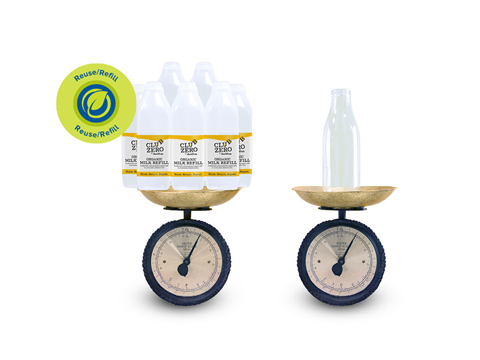
Berry Global is now supplying Abel & Cole with polypropylene bottles for its Club Zero Refillable Milk delivery service; the bottles are designed to be a lightweight alternative to glass and can apparently be refilled up to 16 times before recycling.
Last October, Abel & Cole debuted the first Club Zero Refillable Milk bottles. It was anticipated that they could have the carbon footprint of the company’s single-use milk bottles in only four uses, with glass bottles said to require over 15 returns to achieve similar savings.
Based on Abel & Cole’s annual sales of 600,000 bottles and an estimated return rate of 75%, it was also thought that the solution could save 450,000 single-use plastic milk bottles, as well as 23 tonnes of plastic.
The bottles from Berry, made from 100% ‘widely recyclable’ polypropylene, are still believed to have the same benefits. They were reverse-engineered to fit Abel & Cole’s existing low-density polyethylene milk bottle cap and other established factory equipment – a move hoped to negate the need for further investments.
They are also designed to fit into existing single-use milk crates, the companies explain.
With Abel & Cole’s eight-stage cleaning process aiming to reduce bacterial contamination risks by cutting out the drying stage – instead cleaning returned bottles thoroughly, then conveying them to the cleanroom for refilling – the bottles are handle-free to minimize ‘trap points’ where bacteria might gather and facilitating easy drainage.
‘Rigorous’ chemical tests have been undertaken by Berry to make sure that polypropylene is strong and durable enough to withstand high processing temperatures and ensure that, unlike glass alternatives, the plastic bottles do not break. Their labels encourage consumers to return the packs while also providing an ‘early warning’ system for each bottle’s end-of-life, with the degradation of the label itself set to indicate when it is time for Abel & Cole to recycle each bottle.
“When it comes to packaging materials, plastic is often seen as the enemy,” said Hugo Lynch, sustainability lead at Abel & Cole. “But we challenged ourselves to ask if it was better to use glass, which is heavier and more energy-intensive to make, or to go against the grain.”
“We are committed to delivering innovative, reusable packaging solutions that help our customers make transformative leaps toward their sustainability goals,” added Sue Springett, senior marketing manager for Berry Agile Solutions. “Through circular partnerships like these, we unpack complexities and help our customers understand what’s possible for the plastic substrate.”
Since its launch, the one-litre Club Zero Refillable Milk bottle has apparently experienced a 20% uplift in sales week-on-week. Abel & Cole reports that the current return rate is 64%, but the company has targeted a minimum of 75%.
In other news, Milk & More and Again provided customers with refillable glass bottles and a complementary doorstep collection service in an initial region trial with Tom Parker Creamery last year. The partnership was then extended to include additional dairy products and beverages from Brown Cow Organics, Belvoir Farm, and other branded products.
Milk & More also worked with Coca-Cola Europacific Partners in a trial to deliver reusable Coca-Cola Zero Sugar glass bottles to consumers’ doorsteps. These were then returned and refilled for reuse in an effort to reduce both waste and greenhouse gas emissions.
More recently, dotch has received two German Packaging Awards for its reusable glass bottle designed for pre-packed food. Consumers can apparently return their empty bottles to any standard reverse vending machine to be returned, enabling smaller companies to adopt the solution.
If you liked this story, you might also enjoy:
How are the top brands progressing on packaging sustainability?
Sustainable Innovation Report 2024: Current trends and future priorities
Reuse vs. single use – which is better for the environment?
The ultimate guide to global plastic sustainability regulation














No comments yet